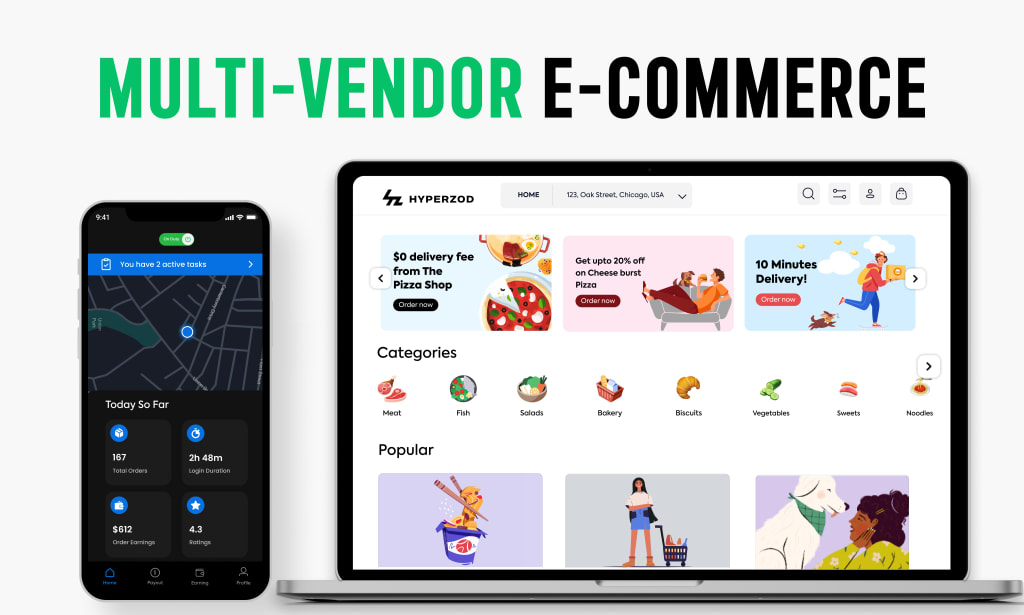Maximize Profits in the Digital Age: Discovering the Benefits of Multi-Vendor eCommerce Marketplace Software Platforms
Multi-vendor e-commerce marketplace platforms- Leading businesses into a thriving state

Everything present on the Earth is subjected to a continuous process of evolution, an ever-changing phenomenon that affects both tangible and intangible aspects of our world. While we are quite familiar with the physical changes that take place in tangible objects, the evolution of non-tangible entities can often come as a surprise.
The rapid pace at which technology has advanced in recent years has brought about remarkable evolution in various non-tangible domains, particularly in the market. Gone are the days when the market operated solely through traditional offline methods. The advent of technology has revolutionized the market landscape, transforming the way businesses operate and how consumers interact with them.
The Technological Shift in the Market
Decades ago, market operations were heavily reliant on offline methods, such as word-of-mouth marketing, print media, and physical stores. Consumers would step out of their homes or offices to make purchases from stores in their neighborhood, engaging in face-to-face interactions with sellers. However, with the entry of technology, the market experienced a significant shift that impacted consumer behavior and businesses alike.
The convenience brought about by technology was unprecedented. With the advent of smartphones and easy internet access, people gained access to information from all around the world at the touch of their fingertips. Communication was revolutionized, not just through voice calls but also through video calls, providing an experience of comfort like never before.
As technology became more ingrained in people's lives, it inevitably impacted businesses as well. Companies that were solely dependent on offline modes had to adapt to the changing market dynamics. Online channels became an essential part of their strategy as consumers increasingly turned to the internet for product information and purchases.
The greatest leap came with the emergence of e-commerce platforms in the retail sector towards the end of the last century. E-commerce software revolutionized the way businesses operated, providing retailers with the opportunity to take their business online. This transition made it incredibly easy for customers to make purchases through mobile apps or websites, from the comfort of their homes.
However, in a world of constant evolution, the demand for convenience continued to grow. Customers expected faster delivery times, and technology was ready to answer the call. Enter hyperlocal e-commerce delivery solution, a game-changer in the world of fast deliveries.
Hyperlocal e-commerce allowed for super-fast delivery from nearby vendors to customers in the same vicinity. The key differentiator was the use of automation, enabling quick and efficient order processing and delivery. This automation gave hyperlocal e-commerce an edge over traditional e-commerce methods, making it a preferred choice for both consumers and retailers.
The impact of hyperlocal e-commerce was substantial, leading to remarkable growth in the global hyperlocal services market. In 2021, the market was valued at a staggering $1.5 trillion, and it is projected to reach a staggering $5.9 trillion by 2031, growing at a CAGR of 14.4% from 2022 to 2031.
The Multi Vendor Marketplace Platforms: Savior for Vendors, big or small
Technology has proved to be a savior for local vendors, who often found it challenging to compete with large-scale market players. The pandemic further highlighted the importance of being online and adapting to changing consumer behaviors. Many vendors faced dire circumstances, but technology provided them with an opportunity not just to go online but also to be competitive in a market dominated by giants like Amazon, UberEats, or Flipkart. Multi vendor marketplace software was instrumental in enabling vendors to participate in digital marketplaces.
Multi vendor marketplaces allowed multiple sellers to offer their products on a single platform, attracting a wider range of buyers. These platforms provided a level playing field for sellers, as they didn't have to invest significant resources in building their dedicated software from scratch. This democratization of online sales had a tremendous impact on businesses, leveling the playing field and fostering healthy competition.
Let's delve into the myriad benefits that multi vendor marketplace software brought to businesses:
Facilitating Effortless Onboarding for Merchants: In a rapidly digitalizing world, while many individuals have embraced technology, some, particularly older generations or those residing in developing nations, may still be hesitant to fully utilize its potential. The fear of complex onboarding processes can be a significant deterrent for potential vendors, hindering their entry into the digital marketplace. Fortunately, modern multi vendor marketplace platforms have recognized this concern and worked diligently to offer streamlined and user-friendly onboarding procedures. By simplifying the process, vendors can easily transit their products online, connect with buyers, and expand their market share without being overwhelmed by technical intricacies. The accessibility of these platforms promotes inclusivity, enabling a diverse range of vendors to thrive in the digital marketplace.
A Focus on Lightning-Fast Delivery: The essence of competitive marketplace platforms lies in their unwavering commitment to providing rapid and reliable deliveries, ensuring that customers receive their orders at their doorsteps promptly. To achieve this, these platforms employ an array of advanced features and cutting-edge tools, such as specialized driver apps that display optimized delivery routes to delivery agents. This technology enables delivery agents to navigate through city traffic efficiently, minimizing delivery times to a fraction of what they once were. The advent of trending 10-minute deliveries showcases the power of technology in enhancing the shopping experience for customers. Not only does swift delivery instill confidence in the marketplace, but it also offers a competitive edge to vendors. Research indicates that fast delivery can significantly impact overall profit margins, with 41% of consumers expressing a willingness to pay extra charges for the convenience of same-day delivery.
Unlimited Scalability for Enduring Growth: Every business dreams of sustained growth and long-term success, and achieving such aspirations necessitates scalability. In the realm of online digital marketplaces, scalability is of paramount importance, especially when the number of incoming orders surpass expectations. Traditionally, this surge in activity may lead to a decrease in the performance of the platform, hindering scalability dreams. However, modern multi vendor marketplace platforms have successfully addressed this challenge through the incorporation of cutting-edge technology, such as Amazon Web Services (AWS). This technological foundation empowers platforms to handle a considerable number of vendors and orders seamlessly, ensuring uninterrupted and unlimited scalability, even during peak hours. The result is an ecosystem that thrives on accommodating growth and meeting the demands of an expanding customer base.
The Power of Automation in Driving Efficiency: In a fast-paced world, efficiency is essential, both for consumers and businesses. Recognizing this need, multi vendor marketplace software has leveraged automation to streamline various processes, particularly in ordering and delivery. By automatically assigning orders to the most suitable delivery agents, these platforms optimize operations, saving valuable time and resources for businesses. This newfound efficiency allows employees to focus on more productive tasks, maximizing their potential and enhancing overall business productivity. Moreover, automation benefits vendors as well, as it eliminates the need for manual order acceptance, streamlining their workflow and ensuring a seamless transaction process.
Empowering Marketing Strategies with Built-In Tools: A critical aspect of any successful business lies in its marketing strategies. A futuristic multi vendor marketplace platform understands the importance of this facet and offers a wealth of business-centric features, including built-in marketing tools. These valuable tools, such as discounts, coupons, and referral programs, act as powerful instruments to expand the customer base, increase average shopping cart values, and ultimately boost profitability for vendors. By providing these marketing assets, multi vendor marketplace platforms empower businesses to craft targeted and compelling campaigns that resonate with their audiences, fostering a sustainable and thriving marketplace ecosystem.
Security and Diversity in Online Payment Methods: In any platform, the payment process is of utmost importance, as it directly impacts the overall customer experience. Ensuring seamless and secure transactions is essential for both customers and vendors. Technical glitches or insecurities can lead to lost sales and erode customer trust. Happy customers increase revenue by up to 10% and reduce costs by up to 25%. To cater to the convenience and security of all stakeholders, multi-vendor ecommerce marketplace software seamlessly integrates with trustworthy payment gateways such as Stripe and PayPal. These established gateways ensure swift and secure transactions, fostering a sense of confidence in customers while engaging in online transactions. Furthermore, staying at the forefront of technological advancements, some advanced software has incorporated payment gateways like Coinbase, offering customers the option to pay with cryptocurrencies, a preference embraced by an increasing number of tech-savvy individuals.
Enhanced Efficiency through Mobile Apps: The rise of ordering apps for easy product discovery and checkout is a familiar experience for customers. The entire food delivery app industry is expected to reach $165 billion market size by 2029. However, modern multi vendor marketplace software goes above and beyond with its functionalities. These platforms offer dedicated vendor apps that empower sellers to manage their online stores efficiently and effectively. From effortlessly uploading product details to monitoring inventory levels and generating detailed reports, vendors have the necessary tools at their fingertips to succeed in the digital marketplace. Similarly, delivery agents are equipped with driver apps, designed with functionalities dedicated to expedite and optimize delivery processes. By maximizing the potential of mobile apps, multi vendor marketplace platforms enhance overall efficiency and create a seamless experience for all users involved.
24/7 Order Scheduling for Unrestricted Convenience: The allure of online marketplace platforms lies in their ability to operate 24/7, offering convenience and accessibility to customers at any time. The ability for customers to place orders and schedule deliveries according to their preferences is a hallmark of a customer-centric platform. To cater to these demands and drive increased profitability for businesses, modern marketplace software provides comprehensive order scheduling options. Customers have the flexibility to select specific dates and times for their deliveries, allowing them to receive their orders when it is most convenient for them. This feature is especially valuable for customers with busy schedules or those commuting between distant places, ensuring an uninterrupted and hassle-free shopping experience.
Final Words:
In light of these advantages and the continuous growth of retail e-commerce sales, it is evident that multi vendor marketplace platforms have had a significant impact on the business landscape. The figures speak for themselves: In 2021, retail e-commerce sales amounted to approximately 5.2 trillion U.S. dollars worldwide. This figure is forecast to grow by 56 percent over the next few years, reaching about 8.1 trillion dollars by 2026.
The benefits derived from multi vendor marketplace platforms are tremendous, and the rapid advancement of technology only reinforces the need for businesses to embrace online modes and leverage the power of digital marketplaces. Those who fail to adapt may find it increasingly challenging to compete and thrive in the evolving market.
As we look ahead to the future, it is clear that technology will continue to be a driving force behind further market evolutions, and businesses must stay agile and adaptable to capitalize on the opportunities it presents.
About the Creator
Dr. Shamael Zaheer Khan
Academician| Digital Marketer| SEO strategist| Guest Columnist| Content Writer| Speaker| Soft Skills Trainer| Chief of Marketing and Strategy at a leading SaaS firm






Comments
There are no comments for this story
Be the first to respond and start the conversation.